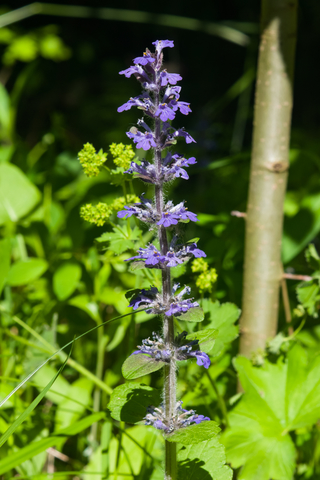Bugleweed Herb

Also known as Lycopus virginicus, Gipsyweed, Sweet Bugle, Water Horehound, and Water Bugle, Green Wolf's Foot, and Wolfstrapp
Introduction Not to be confused with Carpet bugle or common bugle (Ajuga virginicus), bugleweed is a marshland native to Europe and naturalized to the United States in the 17th century by colonists who grew it for its medicinal qualities. It bears clusters of white, bugle-like flowers where stems connect to leaves. It is of the lamiaceae family, but is often referred to as the "odorless mint". The botanical name Lycopus refers to the resemblance of the cut leaf to a wolf's paw, which also explains the plethora of common names in many languages referring to wolves. Traditionally is has been used for nosebleeds, heavy menstrual bleeding, coughs, as a sedative and as an astringent. Today many herbal practitioners use it to help relive an over-active thyroid, including the symptoms associated with it including racing heart, shaking and tightness of breath.
Constituents Organic acids, lithospermic acid.
Parts Used Dried leaves and flowers.
Typical Preparations Teas, and less frequently, tinctures and encapsulations. Combined with gromwell and/or lemon balm to treat thyroid disease.
Summary Bugleweed is used in contemporary herbal medicine as a treatment for overactive thyroid (hyperthyroidism) and breast pain (mastodynia). The lithospermic acid in bugleweed is believed to decrease levels of certain hormones, especially the thyroid hormone thyroxine (T4). This compound also keeps antibodies from binding to and "burning out" cells in an overactive thyroid gland. By moderating estrogen levels, bugleweed relieves cyclic breast pain in women. Bugleweed has also been used for a great many years as a symptomatic treatment for Grave's disease.
Precautions Don't use bugleweed as a substitute for medical care for hyperthyroidism and high doses may enlarge the thyroid. Its use while pregnant is not recommended.
PURCHASE BUGLEWEED HERB EXTRACT
For educational purposes only. This information has not been evaluated by the Food and Drug Administration. This information is not intended to diagnose, treat, cure, or prevent any disease.
This information courtesy of MOUNTAIN ROSE HERBS, with full, written permission for reuse. For further traditional information concerning Bugleweed, please visit this excellent resource from Botanical.com. Used with full, written permission.






